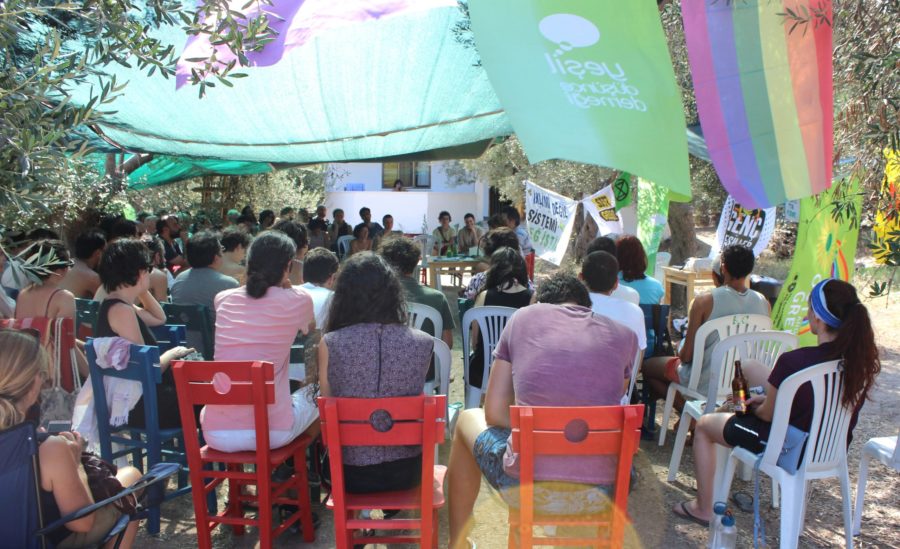
Green Thought Association (Yeşil Düşünce Derneği) is receiving a grant and capacity-development support from our Institutional Fund to increase the impact of the association’s work in the fields of ecology and sustainability, climate change and economy, democracy and the media, and social policies by improving its impact measurement capacity.
Read below our interview:
This is the first time that the Green Thought Association is receiving a grant from our Foundation under the Institutional Fund. Can you tell us about the aim and activities of your association?
Green Thought Association was established in 2009 to promote green thinking and green policies. We work on ecology, climate crisis, renewable energy, green economy, social policies, democracy, and media. We have carried out national and international projects and campaigns on climate change, financing of renewable energy, energy cooperatives and energy democracy, urban policies, and digital activism. Currently, we are implementing projects around issues such as cities, gender, green economy, nature rights and eco-crime, and eco-democracy. In addition to these, we have been carrying out traditional events and activities such as Green Camp and Green Dialogue, which we can call the meeting points of the green movement, for several years.
What are green policies? What kind of studies are carried out to disseminate green policies in Turkey?
Green policies are instruments for the realisation of our social organisation and individual lives in line with a nature-centred worldview. On the other hand, although there is a perception that green policies are only about the environment, issues such as non-violence, anti-war, decentralisation, gender equality, local and direct democracy, fair sharing, free life, and pluralism are also crucial for green policies. Also, the contributions of various civil society organisations (CSOs) regarding ecology, awareness-raising activities, and alternative economic models that cooperatives are trying to build toward the spread of green policies in Turkey cannot be ignored.
Green policies are instruments for the realisation of our social organisation and individual lives in line with a nature-centred worldview.
You are running the Gender Studies for Green Policies project in partnership with the Green European Foundation (GEF). Can you tell us about the purpose and activities of the project?
This project is based on working on the intersectionality between green policies and gender, establishing a link between the two fields and developing various networks. In the first year of the project, we held various workshops on feminism, queer, green literature, and activism, within the scope of capacity-building for CSOs. We also prepared a video and held a conference called Women in Power with the participation of speakers from international and national gender studies and ecology activism.
In the second year of the project, we held meetings where we brought together people working on the intersectionality of gender with the climate crisis, renewable energy, and nature struggles. In 2021, we recorded a short podcast with people who are active in these two fields, and we held the second Women in Power conference. We will continue to emphasise gender, sexuality, freedom of sexual orientation and feminism within the framework of gender equality, which is one of the basic principles of our association, while at the same time emphasising their common struggles with ecology, climate crisis, and nature struggles.
With the pandemic, green cities have become more and more on the agenda. What is a green city? What are the prominent needs for green cities? How can the sustainability of green cities be ensured?
There are various definitions for green cities. “A city that emphasises energy efficiency and renewable energy in all its activities, widely supports green solutions, ensures land compactness through practices such as mixed land use in planning systems, and links its local development to the principles of green growth and equality” can be an example.
Furthermore, in the context of harmony with nature, the limits of the planet and green policy’s stance against growth fetishism, green cities can be defined as “a city in balance with nature where all forms of nature, from living organisms to habitats, are extremely important components of urban form and part of green infrastructure”.
Today, the prominent needs for green cities are harmony with nature, the realisation of direct democracy and social justice.
Failure to adopt and implement principles such as pluralism and fair sharing, which are crucial for green policies, will prevent cities from being characterised as green. For instance, a municipality that discriminates against refugees cannot be considered green. Today, the prominent needs for green cities are harmony with nature, the realisation of direct democracy and social justice.
To ensure the sustainability of green cities, it is necessary to implement mechanisms such as local climate councils and community-supported agriculture. This way direct democracy and social justice can be ensured, along with policies that encourage green infrastructure practices such as rainwater harvesting. Because sustainability has 3 dimensions: ecological, economic, and social.
Which organisational development areas will you focus on with the grant and capacity development support provided by our Institutional Fund?
With this grant, we aim to improve our capacity mainly in impact monitoring. We plan to create an in-house impact monitoring group, organise trainings, prepare monitoring templates and produce data visualisation templates. In addition, we will develop our capacity in terms of fundraising, administrative and organisational structure, campaigning, advocacy, and relations with institutions.
About Green Thought Association
Green Thought Association bases its work on the climate crisis and aims to promote green policies. The association works in the fields of renewable energy, green economy, ecological sustainability, democracy and the media, and social justice.



